#so with this framework it is Completely Impossible for me to really describe characters with modern queer terminology
Text
so... the whole thing about Lyctorhood is that the soul of the cavalier is preserved and trapped in the body of the Lyctor, right? Thereby preventing the ghost from entering the River and (probably) from “crossing” the River or going to “the River beyond” (Abigail’s term iirc). It remains forcibly anchored to the Lyctor, as a “battery” or “furnace” for their power. This battery is somehow good for up to and beyond 10,000 years--the OG Lyctors still have unlimited power, which is inexhaustible thanergy as Harrow perceives it. I believe Tumblr user mayasaura (sorry if I’m attributing wrong) said that perhaps this impossible power comes from the “friction” of the ghost of the cavalier being prevented from entering the River--the soul being, uh, the waterwheel turned in the River. We know that thanergy fades over time. Augustine and Mercy confront John about it at the end of HtN--they’ve figured out that he has Lyctoral power (or at least they think they have). But somehow, the thanergy of the consumed soul never fades.
But I’m sort of unconvinced that “perfect Lyctorhood,” the cavalier preserving process Mercy and Augustine assume exists, is truly going to be presented as a goal for the characters.
Pyrrha tells Gideon that she and Gideon the First “compartmentalized from the Eightfold Word.” Gideon the First doesn’t seem to suffer from any of the same problems as Harrow, having normal Lyctoral powers, but when he goes “under,” Pyrrha wakes up--sometimes. Harrow can’t access the automatic processes that Gideon (Nav) as her consumed cavalier would give her--reflexes and fighting when she’s in the River mentally, healing, etc., but she does have unlimited thanergy to use consciously, like the other Lyctors.
Ianthe also has trouble accessing Babs’ fighting skills, but this is due to her rejection of her mended arm, physically. Once that’s resolved, she stops “fighting” Babs. Her struggles suggest, to me, that she also hasn’t “apprehended” the process completely correctly, that Babs is not “integrated” fully. This is shown repeatedly with the descriptions of her eyes as mismatched and often still purple.
Ianthe and Gideon the First can access their automatic Lyctor powers and the only difference we actually know between them and Harrow is that they remember the true nature of their cavaliers. But even Gideon the First’s remembrance/knowledge doesn’t destroy Pyrrha--they still compartmentalize.
My guess is that the ghosts of the other cavaliers (at this point just Babs and maybe Alfred if Augustine is alive in Hell) are actually not totally inaccessible/destroyed--that the compartmentalization is happening perhaps every time. The real question is whether they can be pulled back like Gideon Nav and Pyrrha were. After all, we don’t know what the steps that Ianthe describes in GtN really mean: analyze, preserve, connect, etc. If part of it is missed/muddled, the cavalier’s soul doesn’t fully settle into its new home inside the Lyctor?
My other guess is that it is somehow extremely problematic to work in this true Lyctor framework--I mean, if Gideon’s body were alive, how would Harrow survive being in the River, except by being physically guarded by her? Gideon’s soul would be in Gideon, not waiting to puppet Harrow! How would this perfect Lyctor actually access unlimited thanergy without a tethered soul that wants to return to its body/enter the River? The power seems to require the death of the cavalier, in order to use the soul as fuel--otherwise what is the idea? A body swap? Power sharing? A guarantee against death by soul sharing? Doesn’t sound like the unlimited power of a Lyctor! The process we know--analyze, preserve, link physically by eating, consume--is violent and would presumably be violent and terrible to do to a living person as well as a murdered soul.
(As many have pointed out, the necromancer/cavalier power dynamic is designed socially to get the cav to surrender wholly to the necro as a matter of duty, to act as proxy for the necromancer physically, to preserve the necromancer’s life and power. A process rendering both immortal would undermine this setup and, sorry, undermine physics and the way magic is constructed in the universe. A solution to the social power problem and the magical power problem won’t arise out of the system that has the problems)
(It being a solution also works contrary to the messaging/hints set up about the fundamental evil of necromancy--power that derives from dealing death and exploiting the dead (as well as the living--but that’s empire as a thing, not a magic system). Whether BOE’s perspective of it as totally evil is a bit of a straw man, the actual science itself is grim and gory as depicted in the books.)
I don’t know whether this will affect a “happy” ending because I have no clue where these are going and I don’t really want to predict the end, I am just very doubtful that this is a solution to Gideon and Harrow’s problem, or Cam and Pal’s, on its own. Especially in a story that’s all about Resurrection.
Addenda:
I have seen other posts (sorry, don't recall which, was when I was lurking on here) pointing out that Mercy’s dustcloud eyes are described as constantly stormy, in motion, with so many colors that they could conceivably be a blend of two peoples’ eyes. Augustine’s eyes are also, in my humble opinion, up for debate--simply because his cavalier was his brother, and could have already had the same color eyes. We know that Harrow and Ortus have the same eye color (Drearburh black) and that she assumes the switch has occurred (some point where she looks into a mirror in HtN, don’t have book with me at this second). We don’t know how “perfectly” their (Mercy and Augustine) Lyctor processes went--especially since they went first and under “scrambling pressure.” G1deon and Cytherea have the incongruous, flipped eyes of their cavaliers, but we can’t say for sure about M and A.
Cam and Pal switch eye colors depending on who’s driving Cam’s body--they are 2 souls sharing 1 body. This is not what is really happening with Gideon 1/Pyrrha or Gideon Nav/Harrow. Gideon Nav is “stuck” behind Harrow’s eyes (literally behind aha) but only emerges when Harrow is murdered and her soul is disconnected from the River bubble (she dies? at least her soul is separate from her body). Gideon 1/Pyrrha have switched back and forth, but once G1deon is dead, Pyrrha alone is in the driver’s seat. They didn’t seem to control when this happens like Cam and Pal do--and Cam and Pal seem to experience some time limit with the switching. Two souls can’t be conscious in the same body at once, not without a single, ruling consciousness/soul driving them-- a la Teacher, or arguably Harrow.
We don’t know if John is a perfect Lyctor--he’s switched eyes with Alecto but this happened, we know, before the Resurrection, bc Mercy and Augustine never saw him with his original eyes. We also know that Alecto isn’t a normal human: if she’s a RB, then maybe it makes sense that she survived, maybe partially, the Lyctor process; perhaps this is why she’s so uncontrolled/inhuman--because her soul is somehow tethered to John and not “with” her in a normal way (besides the possibility of her not having a single, human soul of course). But John’s power doesn’t seem to be Lyctor power--it’s power over time (lots of posts point this out, I can’t find them now).
In the NtN excerpt, Pyrrha retains the Lyctoral healing, even though Gideon the First is dead and she is simply her soul in his body. What is going on? the Lyctor system should be kaput. likewise, Cam and Pal--they don’t need the sun protection either, but they are not Lyctors either. Perhaps immortality does derive from shifting the soul around--or blending souls--or something else--we just don't have the info.
#the locked tomb#tlt meta#tlt theory#the locked tomb meta#perfect lyctor#there is no perfect lyctorhood something else is afoot#is my theory anyway#this is so disorganized but whatever
46 notes
·
View notes
Text
The Book of the Unnamed Midwife

Triggers
rape and sexual slavery, abuse, childhood sexual assault and child marriage, suicide, child death, homo/biphobia, a bit of transphobia, misogyny, religion, racism, a character is drugged against their will, and I honestly would kind of describe it as a small forcefem section at the ending?
Summary
The Book of the Unnamed Midwife is a post apocalyptic gendercide novel. An unknown virus killed almost all of humanity, where women and children had a higher fatality rate, leaving basically a ten to one ratio of men to women. Because this is a gendercide novel it explores ideas of gender and patriarchy in a world where society has completely collapsed, the triggers above should give you some information as to how those ideas are explored. Because of those triggers we see women in this novel deal with this danger in their own ways, with the protagonist dressing and acting as a man throughout the novel.
Specific to this novel though, is the topic of birth and pregnancy. Not only were women particularly effected by the virus, but the infant mortality rate increased to 100%. So, the titular unnamed midwife, while scavenging for supplies like any post apocalyptic protagonist also scavenges for methods of birth control and abortion. For obvious reasons, it's refreshing to see media treat birth control and abortion as lifesaving healthcare.
Links
Openlibrary link (audio book available)
Meg Elison's website featuring her other works
The YouTube video I heard about this book from, which includes other bisexual book recommendations if you'd like to check it out :)
Thoughts
So this is a book I really enjoyed but not for any of the reasons people will recommend this book. Except for maybe the approach to birth control and abortion I mentioned in the summary. What I liked is how granular the details about survival are, the day to day life after the apocalypse, which I thought was written really well. For me that's something that really pulls me into the world and the conflict, but I can definitely see that going the opposite way for others, in that it could be too slow or repetitive.
I also really liked the occasional changes in perspective. We as the reader, despite the framing device of the midwife's journal, aren't always in her head. We get snippets of writing from other characters who cross paths with the midwife and later find out how their stories ended after they left her, which expanded the plot and the rest of the world in a nice way. It allows us to see even more of the reactions to the collapse of society than we would otherwise get which is important when you're examining that as the central idea of your novel, especially in regards to how the collapse of society would affect women.
And here's where I'm going to get into the things I'm more ambivalent to negative about, which are also the reasons people will tell you to read this book and others like it.
Again this is a gendercide novel, where not only has society collapsed, it has collapsed and left more men than women. Without a coherent civilization, people are living solely to survive or solely for pleasure. But since this is a world where women are rare, violent misogyny has come out in full force. And I'm not sure how much I like this framework, which you see often in these novels, to analyze patriarchy and misogyny.
Two, caveats here: one, this is not me going #notallmen which will hopefully already come through if I phrase things the way I want them but I want to put that up front. Two, I don't really care about spoilers but the rest of the review will contain spoilers from here on out for those who do. I would recommend going in spoiler free but also it's impossible for me to analyze the things I want to without at least vaguely discussing middle portions of the novel.
Okay. So. When we talk about post apocalyptic novels, we're often dealing with authors saying intentionally or not, that this is what humans are like without society. Often, it's humans at their worst, desperate to survive at any cost and sometimes contrasted with people trying to rebuild society in the way they see fit.
When there's a feminist angle to this premise and especially when there's the imbalanced ratio of men to women you see in gendercide novels, we're then discussing specifically men and their misogyny at its worst.
Without society in this novel, we see men within months of the virus decimating humanity viewing women as literal commodities to be traded like food and water, forcing women into sexual slavery, and running after the protagonist to kidnap her and do god knows what the second they see she's a woman.
And here's where I'm conflicted. Obviously, misogyny and problems like human trafficking, rape, and domestic abuse are already common today and I'm not disputing that these issues would get worse with any kind of horrific disaster. We already see that too. But its important to make a distinction between misogyny caused by an array of societal conditions and pressures, and it being inherent.
Obviously these men were alive before the virus, and while society may not be acting on them at the present, they're still carrying over the same values until they come in conflict with them. But what they represent is the equation of men without society, and often men without women. Which makes them desperate and violent for any woman in this story. To me, I feel conflicted because as its presented in the novel, its not bioessentialist, but it doesn't seem to push back on that idea very hard either. Instead it seems to say that this is the eventual outcome of every man, even the ones who are nice to the protagonist. For example, we see the protagonists one time love interest or well, fuckbuddy is more accurate, who once brought her books only written by women end up marrying a child bride he rescued and once treated like his daughter once his wife dies. The theme is that while it may take some time, sex is such a priority to men that they will seek it no matter how violent and disgusting the ways eventually because of their misogyny and inability to see women as human, rendering them interchangeable. And I'm not sure how well that works as a framework. I think its more important in feminist works to discuss not how society holds men's misogyny back, but how it enforces it instead.
And I think I wouldn't have such a problem with the examples I gave if Elison did not also show the way society enforces misogyny very clearly. One section of the novel has the protagonist stumble upon a community of Mormons, still clinging to their religion and way of life in the middle of the hell around them. That includes enforcing gender roles and subservience in the few women in the community. In fact, the situation around them makes them enforce those roles harder in the name of safety. And its a perfect example of showing society and especially religiously enforced misogyny. Which, for obvious reasons, feel way more important to discuss, but its only a portion of the novel.
While we're talking about this novel's approach to gender, I'd also like to say I'm ambivalent on how Elison approaches her protagonist's gender as well. What I expected going in was much less groundbreaking than what I got. The protagonist never really felt like anything more than a cis woman to me personally. In fact, there's very little reflection on her own gender, even though she's full time presenting as a man for her own safety. And it never felt like anything more than that to me. I'm putting the nonbinary tag anyways because I'm not sure, I think this could read differently for other people than it did for me and they might appreciate it more. Other trans people never show up in the novel, except for offhand mentions of them existing and a very...unclear situation at the end that made me put forcefem in the trigger warnings. I wouldn't say this is exactly a problem in the novel, just a blind spot that I think could have been more explored. I can't lie, I was comparing this to Manhunt a lot as a was reading, which is why I wanted more on the subject of gender and gender identity specifically in this world.
One last thing I want to add as a warning is that and I feel like I shouldn't be the one to say this as I am also white, but the writing at times felt very white when it came to characters of color. Its nothing that hasn't been seen before, but I felt like I should warn for it. Especially when there's a very egregious example where the protagonist asks herself if she's wandered into Saudi Arabia when she steps into the Mormon community which, like... just don't.
This is definitely a book which left me very conflicted, but in a way that's good. It's stuck with me, I finished this book weeks ago and I just now finished the review because I kept thinking about how I wanted to phrase things, whether I was reading it right, what I was really saying and what the book was really saying. I think that was worthwhile. Or at least it made me ramble a lot oh my god.
#the book of the unnamed midwife#meg elison#lgbt#lgbtq#bisexual#nonbinary#bookblr#book rec#book recommendations#lgbt books#sci fi books#post apocalyptic#road to nowhere#road to nowhere series#book review
7 notes
·
View notes
Note
20 for the ghosts asks
Thank you for asking and indulging me, and prepare for me to gush unashamedly. (I've been waiting for this one, turn it up!)
20. who is your favourite ghosts creator (artist/fic writer/or person who posts abt ghosts a lot etc)?
I've decided to mention a few favourites for each of these mediums because trying to narrow it down would be utterly impossible (and also this'll give me an opportunity to show some love to my favourite creators without feeling like I'm overstepping, etc.).
It wouldn't feel right to start anywhere else than with @gayvillains and @inkyfishesii. The very first three Ghosts fanfics I read were written by these two creators respectively, and I have never ever come across such writing that I've adored so instantly. Initially, after finishing (what then was) both series of Ghosts, I was looking for some Captain-centric fics and I came across ‘I've Got Termites in the Framework (So Do You)’. Not only did this fic do a superb job of portraying the Captain and Julian, but it introduced me to the concept of Captain/Julian and completely convinced of this particular pairing within like, the first two or three chapters. I went on to read ‘Performative’ and ‘Going Down’ (I think they were recommended in the author's notes of Termites) and was thoroughly gripped by both. Personally, I think everyone should read all the Ghosts fics written by these two, especially Julian enjoyers.
These two writers do an amazingly good job of putting these characters in slightly more serious situations than canon would allow (it is, after all, a light comedy) while still maintaining the overall tone of the show and the characters. I mean, their portrayals of Julian in particular just hit all the right notes for me. They manage to give his character a lot more depth without softening or changing who he is fundamentally, which is no easy feat with Julian. gayvillains does such a wonderful job of portraying the world through Julian's eyes, so much so that you can feel the influence of his character in the diction and tone. Also the way he describes like, the surroundings, the little things that the characters notice and stuff (“and stuff”, can you tell I'm good with words?) makes me feel like I'm right there in the story with the characters rather than just reading about them. inkyfishesii's encyclopaedic knowledge of British politics really lends an authenticity to her portrayal of Julian. There have been many times where I've had to stop reading a fic, throw my phone down and just yell about how perfect a line or moment is. (I'm still not over Julian numbering his smiles, because that is so painfully in character, and it feasts on my mind like maggots on a rotting piece of meat.)
I'd also like to mention Etheostoma (on AO3). Every fic has managed to take me on some type of emotional journey, and I still get goosebumps when I so much as think about ‘Touch Too Much’. Their portrayal of the Captain specifically, especially when he's in an introspective mood, is so gut-wrenchingly beautiful.
Oh, and @toomanyfandomsneverenoughtime for their tireless work in spreading the Fawthorne agenda. Most fics are explicit, which I know is not everyone's cup of tea, but they're really well done and I am very much onboard.
As far as Ghosts artists go, none are more dear to me than @belfryduck, @oochilka, @master-of-the-stars and @habibi-queer. There are many, many incredible Ghosts artists, but these four just take the cake for me. oochilka's style reminds me a lot of Quentin Blake illustrations, which I love very much (I'm pretty sure I've still got ‘Mister Magnolia’ around somewhere). belfryduck always manages to capture the essence of the ghosts perfectly, especially Julian and Humphrey. master-of-the-stars's Julian and Robin are very precious to me, and their JC Leyendecker-inspired art of the ghosts knocks it out of the park every single time. I couldn't tell you exactly what it is that draws me to habibi-queer's art (other than the fact that it is amazing), but I feel it in my soul. Sometimes it genuinely feels like they're creating specifically for me, because it consistently hits all the right spots.
I think it's fair to say that I enjoy the content of every person I follow who posts about Ghosts, so if I follow you and you're a fellow Ghosts enjoyer, then I am talking about you. That being said, I particularly enjoy seeing @historicalsnail, @simonfarnabyslegs and @weepylucifer on my dash, and I am going to need them to keep on keeping on for the sake of everything that is good and evil in this world.
This answer got so out of hand so quickly and I apologise to everyone who is going to see this, but at the same time, y'all should definitely check these creators out.
#reading the question again i don't think i quite understood the assignment#but also i have no regrets#on another note habibi-queer might be one of my favourite artists ever#all of their art fills me with so many emotions and i am so so glad that i found them#you got mail!#bbc ghosts#plq-to
14 notes
·
View notes
Note
What do you think about Kaneki x Eto?
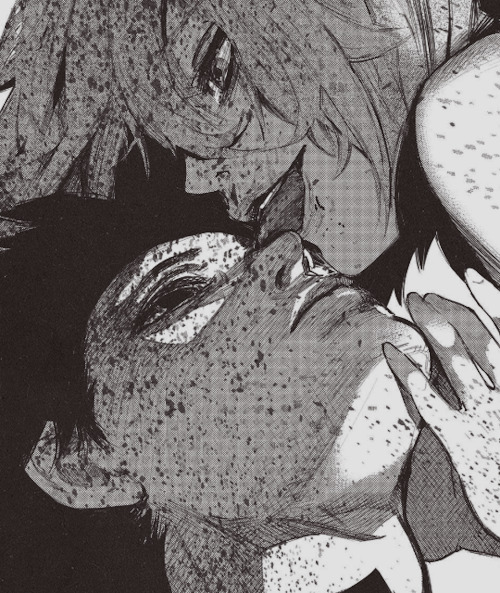
It’s my favorite Tokyo Ghoul ship? If you want to know my opinion of it, I did write a whole fanfiction on the ship. However, I can also explain my reasons for liking the ship with some character analysis. Basically, Kaneki and Eto are the same person. Kaneki loving Eto is him learning to reconcile the ugliest parts of himself. Falling in love with someone who’s just basically you in the mirror is a good way to learn some self esteem. Kaneki and Eto are the same because they’ve felt ostractized and unloved their entire lives due to having selfish and manipulative mothers, and uncaring or entirely absent fathers.
Their response to their total sense of isolation and status as outsiders is to write a story. They both have a narrative coping mechanism of the world, that’s why of all the characters they are the most highly associated with reading and books. It’s just they assign themselves different roles in the narrative. Kaneki is the protagonist of the tragedy, and Eto is the author of the tragedy. It doesn’t change the fact they see the whole world as one big tragedy. More under the cut.
1. The Protagonist of the Tragedy
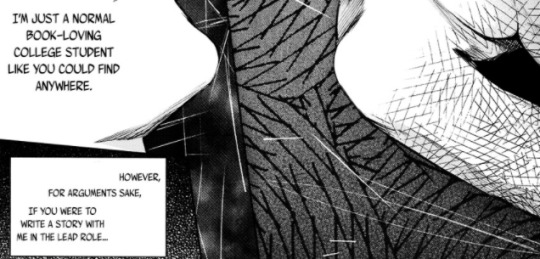
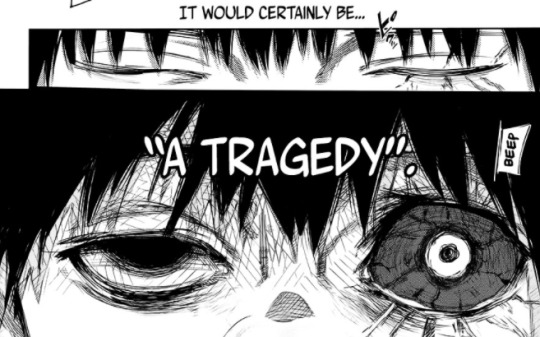
Kaneki’s coping mechanism has always been to imagine himself as the long suffering protagonist of the tragedy. His statement is twofold. “I’m not a protagonist or anything” and then “However if you were to write a story with me in the lead role it would certainly be a tragedy.”
This is paradoxical thinking. What Kaneki is saying essentially is that he is not a protagonist, but he is. The difference between a protagonist of say, a heroic epic, and the protagonist of a tragedy is that a tragic protagonist is ultimately helpless before their flaws.
Kaneki has always been outside of things. He is someone extremely isolated and lonely. He has difficulty connecting even to his lifelong best friend. Hide describes him as thus, he’s always pretending around other people and hiding his true self. Kaneki has this genuine fear of being well... genuine. He avoids emotional intimacy at any cost even though it’s the thing he craves the most.
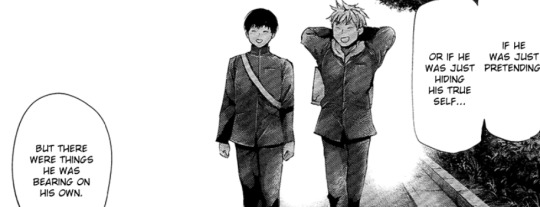
Which is why it’s easier for him to cope with things through a fictitious lens. He wants to be important to people, but he doesn’t really know how to be loved, so he always, always, always, chooses fighting for their sake instead. He plays pretend hero, pretend vigilante, and even pretend king depending on the circumstances. He is always, playing roles for the sake of others instead of trying to be his own self. He pretends to be a protagonist.
However, because of his abuse from his mother Kaneki is also unnaturally fixated on being a good person. He can’t bear to think he’s unkind, or cruel, or even violent like his mother was to him. He has such a strong, nauseous reaction to violence, he can’t even accept it within himself even when circumstances have dirven him to become violent.
So, rather than the protagonist he also wants to keep playing the victim. The victim is helpless. The victim is sympathetic. The victim isn’t to blame for their actions. Kaneki is afraid of being in control of his own actions, because he finds it hard to face himself and his own flaws and bear that responsibility. Kaneki’s coping mechanism is to feign helpelessness. To never truly make decisions because therefore he’s not responsible when he makes the wrong one.
It’s not just Kaneki who is coping poorly however. Whether or not he intends to his actions will always affect the people around him. Kaneki isn’t a protagonist, he’s merely pretending to be one. The problem with pretending to be a protagonist is that as a result you assign other people as supporting characters in your story, and forget that they have feelings outside of what you perceive their feelings to be.
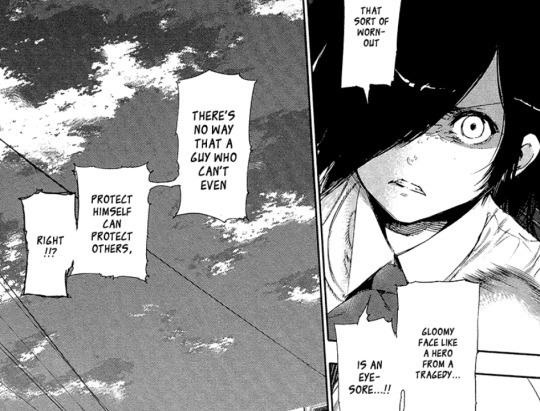
This is specificallly what Touka calls out in 120. She doesn’t want to be the heroine of his tragedy. She didn’t ask for him to protect her. Kaneki does all of these things without thinking or consulting her about her feelings at all and just assumes he knows best. Pretending you’re the protagonist gives you a self-centered view of the world. Kaneki can’t be with Touka at this point, because he can’t accept Touka’s feelings for him.

The most poweful sign of Eto and Kaneki’s connection ever is the fact that Eto has Kaneki completely read like an open book, without even really meeting him in person. It’s because they are in essence the same person. She understands Kaneki’s total sense of isolation because she’s lived it as well for her entire life.
Kaneki feels unloved and disconnected from others, and everything he does ultimately is in response to the lack of love he was shown as a child. That’s why Takatsuki’s lines, your parents failed in raising you. Echo so strongly for both of them.
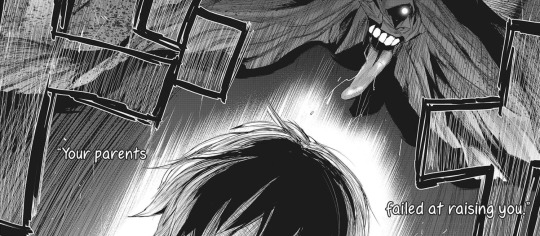
Now kiss you two.
2. The Author of the Tragedy
If Kaneki is someone who will feign helplessness, and avoid being in control of his own life then Eto is the opposite. Eto will pretend to be in control of everything because helplessness is what she fears the most. Eto was born outside of any framework or sense of stability for the world she can’t handle any of it. She longs to knock all of the structures down because they will always reject her and never include her, in the same way that Kaneki longs to be accepted by others.
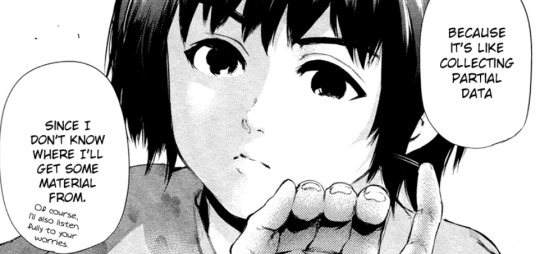
Eto reacts to the whole world like a book too, but she sees herself as the author in control of things. She’s the one writing the scenario. She chooses to bloody her own hands bcause it makes her feel in control of the violence that’s been inflicted upon her, her entire life. The things that Kaneki avoids because he’s afraid of being seen as a monster, Eto embraces willfully and becomes the monster. Eto, just like Kaneki sees everyone else as a fictional character. Whereas, Kaneki assigns them the role of support to his story, Eto sees herself as the author pitting all of the fictional characters against each other.
Kaneki lets himself be manipulated and Eto manipulates. Eto never sees herself as backed into a corner, or desperate. Everything is a planned move on her part. Everything is an intentional sacrifice. If she’s captured, it’s because she willfully walked into their plan and let herself be captured. She’s here because she wants to be. She pretends at all time that everyone is doing what she wants them to.
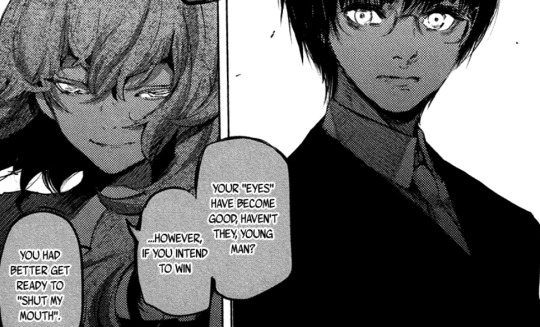
Even when captured and imprisoned in the cochlea, Eto intentionally walked in as a part of her big plan. The thing about Eto’s plans, and plans, and plans is that she’s bad at admitting when she’s losing or things are out of her control. Aogiri could never win an all out war against the CCG. Which is why Eto was too quick to burn Aogiri in a deliberate sacrifice to try to weaken the CCG as a part of her plan, rather than try to take her hands off and try a different approach.
The same way that Kaneki never wants to take control of his own life, Eto never wants to let go of her sense of control. Which is why she’ll pretend to be control even when she isn’t. Eto is just good enough at reading and manipulating people that she can delude herself into thinking that the situation is always in the palm of her hand when it’s not. Which is why things that are genuinely out of her control and impossible to predict have a tendency to explode in her face.
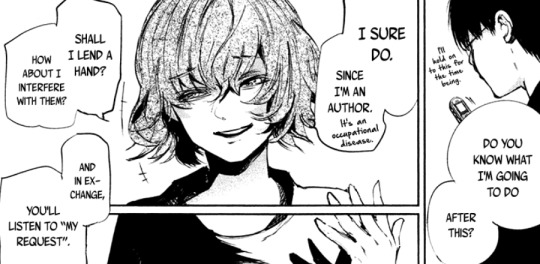
Even when Eto loses, she always sees it as a controlled lost. She wanted Kaneki to defeat her on the Tsukiyama Tower and devour her Kagune. She gave him that victory. She is still in control. She is always the author writing down the tragedy.
The key difference between both of them is that Eto externalizes, and Kaneki internalizes. Eto is trying to fix the world to make up for the inadequacy she sees inside of herself. Kaneki is trying to fix something in himself so people will find him lovable.
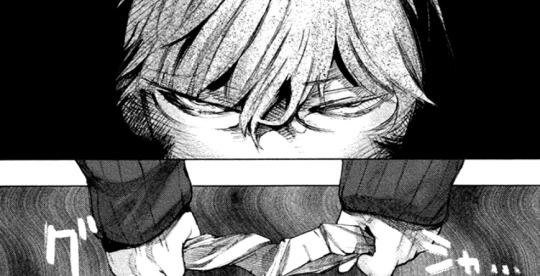

We see in Takatsuki’s flashback chapter that Eto’s resentment of Kuzen and his cowardice, has just as much to do with her desire to destroy V and as her wish for a better world. Kaneki and Eto’s trauma informs their actions just as much as their genuine desire to improve the world. They are wholly created by the traumatic circumstances that have affected them and been poorly coping all of their lives.
The best example to show them poorly coping with trauma is to show how they lash out. Kaneki and Eto are both children raised without any love, and they’ve come to two different conclusions. Kaneki sees himself as unlovable. That nobody is capable of loving him so he sees all relationships as a transaction and services rendered. Eto is the opposite, rather than an internal quality she focuses on an external one. She believes actual love doesn’t exist. That all love is selfish, just like her parents’ love for her ultimately was.
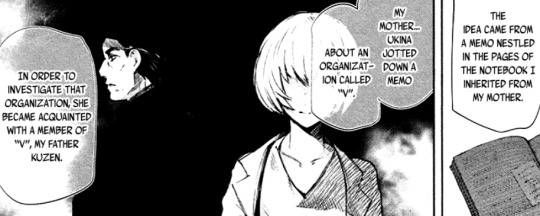
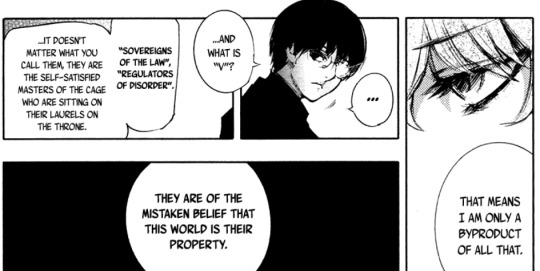
It’s shockingly different the way Eto and Kuzen tell the stories of her birth. Kuzen focuses on the love story aspect, as if Eto was genuinely the product of a love that bridged the gap between two different worlds. Eto believes that her mother was only using Kuzen and sleeping with him to get information, and that she was just an unplanned pregnancy. Eto is incapable of understanding her mother’s love for both her, and her father and chooses to believe no love exists at all. Kaneki on the other hand is incapable of understanding his mother’s contradictory love for him, and chooses to believe himself unlovable.
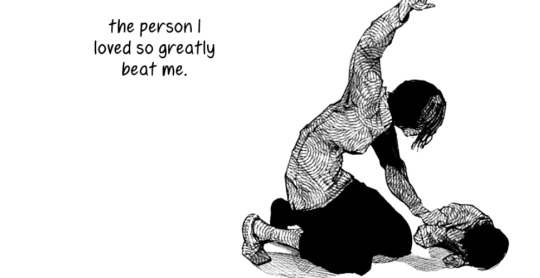

The person I loved so greatly beat me. I loved my mother, didn’t I?
Kaneki and Eto are hurt not because they don’t love their mothers, but they do. Their mothers are extremely important to both of them. Yet, neither mother seems to love them back. Ukina chose Kuzen over protecting her child. Kaneki’s mother chose her sister, and everyone else in the neighborhood to take care of while neglecting and outright beating her child when he asked for basic care. Eto does everything she does in Ukina’s memory to complete her mission, and Kaneki does everything to try to be the good boy his mother wanted him to be for a good portion of his life but neither of them feel loved by that mother figure. Kaneki and Eto were failed on the most basic level by the parents who were meant to be responsible for them and loved them and as a result they are continually coping with that lack of love.

The difference in their coping can be seen how they both treat Kanae. Kanae has an incredible amount in common for both of them. She lives seeking love, she has been orphaned and unloved and treated like an outsider in the Tsukiyama household her entire life even though they were supposed to take care of her as her direct family. She always had a close relationship with her mother before she died. She lives by pretending to be something she’s not in order to look stronger.
Eto’s response is to insist that Kanae’s love is selfish. That she’s an ugly, monster for trying to force her feelings upon Tsukiyama. Eto goes out of her way to try to prove that love is a lie.
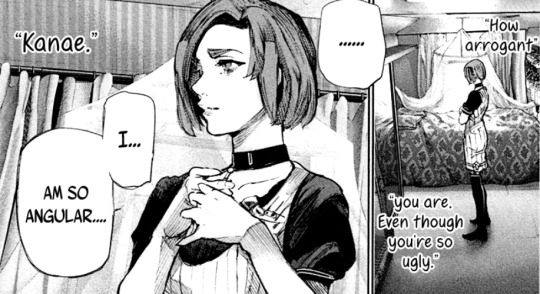
However, Kaneki much more passively also resents the hell out of Kanae. Kaneki’s wish to be loved is the same as Kanae. Kaneki will even become violent for the sake of that wish.
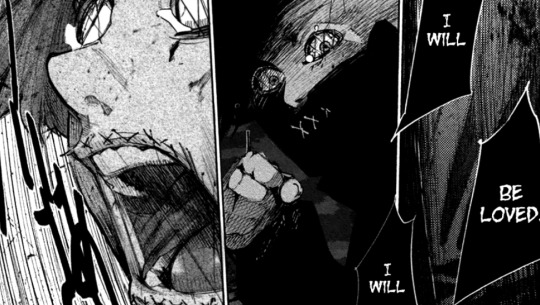
However, this is his response to Kanae at her lowest point.
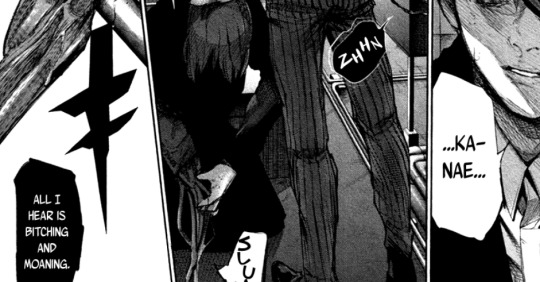

Kaneki’s choice to internalize all of his trauma inside of himself is one that also results in destruction. Remember that this is after Tsukiyama begged Kaneki for mercy on Kanae.
Kaneki’s habits of pretending to be helpless to avoid conflict, lead him into as much conflict as Eto gets into. The coping mechanism is different. The end result is the same. As Haise he spent the entire arc putting off conflict, but he ends up fighting Tsukiyama anyway, ends up brutalizing Kanae in the worst way possible, and even ignores Yoshimura’s wish to save Eto.
They cope very differently. Kaneki is always trying to change himself to suit the needs of other people. Eto is always trying to change other people to suit her own needs. However, the end result is the same. Kaneki’s seems more selfless. He’s letting himself suffer rather than make others suffer. He’s trying to hold it all in, rather than Eto who pushes all of it out. But, both are unhealthy. Eto wants to destroy the world, Kaneki wants to destroy himself.
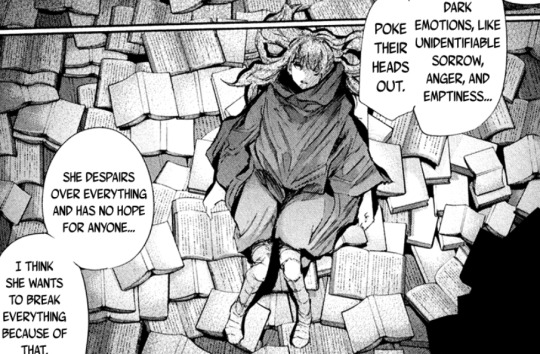
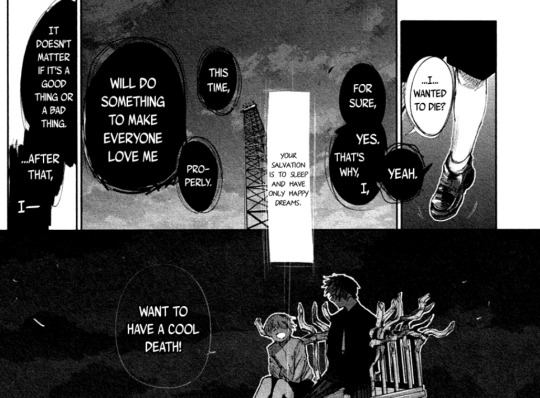
The result is still destruction regardless. Which is why the way Kaneki and Eto both treat Kanae is so important, they’ve both projected themselves onto Kanae, and want to destroy her because of it. They’re coping mechanisms which are meant to preserve them are instead self destructive. Which means ultimately they’re both terribly unhealthy people. The question of which one is good or bad doesn’t really have anything to do with it.
Kaneki and Eto’s relationship is so interesting because they’ve both been pushed to the point, where they’ve stopped hoping for things, and just want to destroy everything. It’s just what they choose to destroy is different, Kaneki wants to self destruct, and Eto wants to take the whole world down with her. That’s why I think they should work together to smash everything into tiny little pieces, and maybe kiss a little bit. There’s just something to be said about a relationship that’s built around learning to love the unhealthiest parts of yourself.
142 notes
·
View notes
Note
Hi, betts!! I always love reading your writing. Do you have any favorite writing exercises for developing consistent, interesting characters?
i’ve written a little bit about characterization before –
developing original characters
describing minor characters
some writing exercises for fanfic
making character stars
character star follow up
there are probably more but those are the ones that come to mind
– but in terms of writing exercises, my go-to, as i’ve mentioned a few times before, is actor interviews. i watch interviews with famous people all the time. i’m addicted to the “personal life” section of every wikipedia page. instagram stories from my faves are my absolute kryptonite. i’ve always hated how i obsess over celebrities, but it’s become a major creative drive for me.
i build characters based on private traits of people i know, and public traits of people i don’t know, and i allow the narrative to fill in the gaps, so that i’m learning about a character as i’m writing them. it keeps me curious and invested in the story i’m telling.
i’m writing this one character right now, and he’s kind of based on a certain actor who is known for his, uh, physique (as actors tend to be). and part of the inspiration for this character is that i thought – what if you had a crush on this guy, and found out how much work and focus it actually takes to look like that? and how his identity has maybe formed around his appearance in this way? and then i thought, okay well what if he’s not an actor, and doesn’t really have an occupational reason to keep up that kind of appearance? what if he’s just some dude in ohio? why would a dude in suburbia have a drive to maintain that over-the-top physique? and what would it be like to have fallen in love with him from afar, only to find out he spends his life eating boiled chicken, working out, and playing world of warcraft?
forcing something impossible into something real is always an inspiration to me. if i can put an unattainable ideal, in this case male beauty, into this gritty real space of 2010 southwest ohio, i now have a framework to make this character more complicated. so, completely by accident, i’ve given him my dad’s bad spending habits and now he’s $20k in credit card debt, forced under the thumb of his rich fiance, who will not marry him until he pays it down. more conflict.
i don’t care much about intelligence in characters, but i care about what they think of their own intelligence. in this guy’s case, he thinks he’s stupid. he’s not, really, but his self-perception is a key to something deeper. why does he think he’s stupid? what led him to develop this belief? his foster daughter, the main character, wants him to homeschool her. previously, he has given her everything, but his self-esteem problems regarding his intelligence overrides his desire to appease her. she is not used to him denying her, or moreover asserting boundaries. more conflict.
he may not be stupid, but he is extremely impressionable, which leads me to his major flaw: he does not have opinions. his perspective of reality is so broken that he does not allow himself to stand firmly on any ground, which will eventually lead him into undesirable, cult-like places, particularly becoming a disciple of his foster daughter, who believes she is possessed by an all-powerful archangel. yet more conflict.
and that made me wonder – what kind of environment shaped a guy like this? a guy who seems hypermasculine and strong but is actually a soft marshmallow who kinda hates himself? obviously, a bad one. so then i developed his parents. the house he grew up in (hoarders). his siblings (2nd of 4). his upbringing (abuse). i go back further and further, until i know him as well as i know my best friends. now all my heavy lifting is done. he guides his own actions on the page. i no longer have to ask myself what should happen, but really, what would this specific character do in this specific situation? that’s all i do – i ask questions.
and of course, since nothing is written in a vacuum, and moreover i am at an artist residency where i have to sound fancy whenever i talk about stuff, i’m interested in how this character can be a commentary on something. this novel is very openly a lolita reversal, road trip americana and everything. i’m entering the story with the question – what would lolita be like if dolores haze had all the power? if she had the wit, intellect, and lack of narrative reliability as humbert humbert? how might a teenage girl completely overpower a grown man? who would that girl have to be?
i know that’s a lot about my process, but i don’t tend to do a lot of discrete exercises. developing good characters is a practice in allowing yourself to observe people neutrally and without judgment, isolate certain traits, plunk them into fictional beasts, and shove them into tense situations to see who they become. you have to stay curious and open, ask hard questions and follow the answers where they lead you. keep a log of interesting things people say and do. pinpoint what you love most about your best friend and hated most about your ex. consider how you would get along with your parents if you were the same age as them. try to see people in as many different lights as you can.
66 notes
·
View notes
Text
710.
Do you read and believe your horoscope?
>> I don’t read horoscopes, no. I don’t find them useful.
Do you have rules for naming your future children?
>> No, largely because I don’t plan on having children.
Why do you think we keep having food recalls?
>> I mean, I don’t think they happen quite that often.
Do food recalls prevent you from eating certain items for long periods?
>> I’ve actually never heard about a food recall that was for a food I actually ate. The last major rash of them was about romaine lettuce, which I don’t eat, and I think I heard about one for bean sprouts recently? which I also don’t eat. But I imagine if there was a recall for something I eat regularly, I’d be pretty paranoid for a bit afterward.
Is a hair dryer a necessity for you?
>> No. I definitely do not have enough hair to warrant using a whole appliance just to dry it.
Which actor, in your opinion, played the best Batman?
>> I don’t have an opinion. I’ve only seen the Nolan Trilogy (which I enjoyed, but it wasn’t exactly Christian Bale’s Batman that I enjoyed...), Batman v Superman for some reason (let’s just not even talk about that), and one of the nineties flicks, but that was so long ago that I definitely have no opinion about it now.
Would you stop and ask for directions if you were lost?
>> Well, it’s not really necessary these days, I have a smartphone. But if I couldn’t use that for some reason, then yeah, absolutely. Done it before and would do it again.
If you were atop a tall building, would you throw stuff at people below?
>> No.
Do you melt when you see gorgeous eyes?
>> No???
If Simon rejected you at AI tryouts, would you tell him off?
>> It actually took me a few seconds to figure out what this was about, lmao. But I wouldn’t be on American Idol tryouts in the first place, because I really don’t care for shows like that (or competitions, period). And if for some reason I was trying out, I don’t see what purpose being a dick to Simon Cowell would serve except making me even more exhausted than I probably already would be.
Do you believe we really landed on the moon?
>> Sure. I can definitely understand how it would seem implausible. It really kind of does, all space travel does. But I wouldn’t go so far as to believe it was staged.
Would you drive "The Shaggin' Wagon" from Dumb & Dumber?
>> I... only have the barest recollection of that movie. Was... was it a van that was covered in fur to make it look like a dog? Because that image just popped into my head and I don’t know if it was from this movie or a completely different one. Regardless, I definitely would not drive that abomination.
If a spaceship landed on your front lawn, what would be your 1st reaction?
>> “We have a front lawn?” (I live in an apartment complex, lol. But either way, I can’t imagine how I’d react to a spacecraft just. landing outside. That’s beyond my dubious ability to predict my reactions to things.)
Have you ever TURNED DOWN an invite to a wedding? Why?
>> I’ve only been invited to three and I went to all three.
Do you believe people should get married in a church?
>> Fuck no, I sure didn’t, and neither did the two friends of mine whose weddings I attended. The third wedding I attended was because I was invited along with Sparrow, whose family member was getting married, and that was in a church. It... was surreal, tbh. Not a fan.
Have you stuck your hand up a vending machine to try and get something out?
>> Yeah.
Mail letters at the post office or place them in your mailbox for pick-up?
>> Put them in the “outgoing” slot in the mailbox.
Ever filled out magazine subscription cards for someone else as a joke?
>> No.
What items would you NOT buy from a rummage sale?
>> I mean, there’s a lot of things I wouldn’t buy from a rummage sale, just... personal items, I guess.
If there's a food drive, do you start searching for stuff YOU wouldn't eat?
>> I haven’t participated in a food drive, but if I did I would definitely not donate food I wouldn’t myself eat. I used to be homeless, okay, and the worst thing is to get food donations and it’s just a bunch of shit you can’t really use or find completely unpalatable.
Does the news depress you?
>> I mean, no, mostly because I don’t watch it in the first place.
Name a movie everyone else thought was funny, but you couldn't stand:
>> A lot of people seemed to enjoy Superbad but I found it intolerable.
Do you think sets of kitchen utensils should include sporks?
>> Not really. But it’s not necessarily a bad idea, either.
Does the mall you go to have an arcade? Do you go in there?
>> Rivertown Crossings does, but it’s wack. Nothing like how arcades were back in the day. I stuck my head in once to see if they had DDR (they didn’t) but I wouldn’t go any farther.
What topping do you HATE on pizzas?
>> I haven’t encountered a topping that I hated yet, mostly because I stick to the ones I already know I like.
What is your favorite Little Debbie snack?
>> I don’t eat them.
Got any interesting wigs?
>> I have two wigs, and both are long black-to-white ombre (one regular, one braided). I think they’re very interesting and I love them. Even though the non-braided one is a pain in the fucking ass because it gets impossibly tangled as soon as you even look at it.
You need to go to the bathroom. Finish this first or get up and go?
>> If I had to go to the bathroom, I’d probably go before I started.
Do hypothetical situations honestly prepare a person for what's to come?
>> No. But at least it gets you thinking.
Can you resist temptation?
>> Not always, of course. I’m not a monk.
Do people underestimate your intelligence?
>> I don’t know. I assume people aren’t really giving much thought to me or my intelligence level.
Would a credit card get you into trouble?
>> I will never find out, because I don’t plan on ever having one. (I doubt I could even get approved for one, which is just fine.)
Truth or dare?
>> No.
Do you believe it's okay to tell white lies?
>> I think the specifics of the situation and the moral framework of the individual are what determines whether lying is an acceptable action or not.
What Mario game was your least favorite, and why?
>> ---
Have you ever been snowed in?
>> Sure.
What do you like in your omelettes?
>> Veggies and cheese.
Which is more annoying: sequels or prequels?
>> Meh.
Do you use rechargeable batteries?
>> No. The only things I own that even use batteries are computer peripherals and the batteries need replacing so infrequently that it doesn’t even matter.
Describe the chair you're sitting in. Is it comfy?
>> I’m in a bed, and yes, it’s very cozy.
Do you like to drink Jell-o as you're making it?
>> No??? I mean, I never considered doing that, but if I think about it, I can see why you would.
What do/did you normally get detentions for?
>> ---
Which That 70's Show character would you like to kick it with?
>> ---
Does your alarm clock actually awaken you?
>> I use it infrequently (so I’m not inured to it) and I’m a light sleeper, so yeah, it usually awakens me instantly when I do use it.
Ever think you might have seen a UFO?
>> No.
Does playing games in 2-D bother you because you now play mostly 3-D games?
>> Kind of.
Tell the wierdest name of a town/city you've ever heard:
>> I’ve heard of a lot of weird ones over the years. I think Britain has some really off-the-wall ones. There’s no way I’d remember the exact examples, though.
Do you know anyone who DOESN'T have a cell phone?
>> I don’t think so, but it’s possible.
What would you do if you thought someone was following you?
>> I don’t know, I’d need more specifics than that (like where I am, what time of day it is, etc).
Say a superhero like Spiderman saved you. Would you fall in love?
>> I doubt even being saved by a superhero would somehow make me alloromantic. Maybe I’d want to be friends. Having a superhero friend could be cool.
2 notes
·
View notes
Text
Every Book I Read in 2018
Again, better late than never??
01 On the Town; Marshall Berman - A freewheeling personal and general history of Times Square, which had some great historical tidbits I’d never read before. I think I would have got more out of it if I were interested in Broadway musicals...
02 Stephen Florida; Gabe Habash - A slim little book that follows a college wrestler. One of those books that is described as muscular, when what they mean is brutal.
03 Green Grass, Running Water; Thomas King - Four plot lines intertwine in a story blending mythology, creation, and modern First Nations people dealing with massive transformational change to their lands. I did sometimes feel like I would have enjoyed it more as an audio storytelling experience.
04 People who Eat Darkness: The Fate of Lucie Blackman; Richard Lloyd Parry - I don’t often read books like this, but this is essentially a true-crime sort of story, about the murder of a British woman who works as a bar hostess in Japan. Parry covers not just her story, but the whole aftermath, which even pulls in Tony Blair, eventually.
05 My Brother’s Husband; Gengoroh Tagame - Weirdly, two Japan-related books in a row! Another culture-clash tale, when the Canadian husband visits his deceased husband Ryoji’s single-parent brother. The couple had never been to Japan while Ryoji was alive, and so the story of slow acceptance (helped along by little Kana’s openhearted curiosity) is suffused with sadness.
06 Ghosts of the Tsunami: Life & Death in Japan’s Disaster Zone; Richard Lloyd Parry - And, let’s make it three! When the earthquake and tsunami hit Japan in 2011, I remember thinking that the reaction seemed so orderly, so...Japanese. But this examination puts you right in the various affected communities, following different people, including schoolchildren from Okawa primary. Like with the other Parry book above, we hear about all of the grief, ghosts and lawsuits that follow the disaster.
07 Mademoiselle: Coco Chanel and the Pulse of History; Rhonda K. Garelick - Once she became famous, Coco Chanel built a scaffolding of lies about her past, and the purpose of this biography is to attempt to see the truth behind them. Garelick concentrates heavily on Chanel’s collaboration with the Nazis, which must have been a challenge given that her company still exists, under her name.
08 Kubrick; Michael Herr - “They speak about the dumbing of America as a foregone thing, already completed, but, duh, it’s a process, and we haven’t seen anything yet. The contemplation of this culture isn’t for sissies, and speaking about it without becoming shrill is increasingly difficult, maybe impossible.” Whoa!
09 Call Me by Your Name; Andre Aciman - I did read this after seeing the film, so as usual it was hard to divorce it from the movie experience.
10 The Left Hand of Darkness; Ursula K LeGuin - A thought experiment about a genderless world, seen from the perspective of an off-planet envoy, who has a range of reactions to the world’s inhabitants. The most enduring section of the book involves a brutal 3-month expedition undertaken by the exiled envoy and a local, a trial by ice, wind and snow. A winter read.
11 Stamped from the Beginning; Ibram X. Kendi - I don’t think I’d really fully grokked the idea that southern white supremacy built itself in order to prevent an uprising of the black and white underclasses, together. The basic rubric of this book is separating American movements, parties and individuals’ thinking into one of three categories: assimilationist, segregationist or genuinely antiracist. Supporting results like abolitionism does NOT make one antiracist, since support could come those with less pure motivations. I highly recommend this one, though it was copy-edited in a pretty haphazard manner!
12 Witches, Midwives and Nurses: A History of Women Healers; Barbara Ehrenreich & Dierdre English - A short book charting a couple of parallel stories, of women healers in Europe being dismissed as witches, and the masculinization of medicine (particularly midwifery and the medicine of birth) in the USA.
13 Her Body and Other Parties; Carmen Maria Machado - Short stories skirting the edge of a lot of genres; horror, science fiction, dark comedy. These are women’s stories, that refuse to be dismissed as chick lit. It didn’t connect with me as deeply as it has for some, but I see the appeal.
14 Look Alive Out There; Sloane Crosley - Largely comedic set of essays by a writer whose earlier work I read, about a decade back. It’s a strange experience, to return to someone who has written memoir that seemed to exemplify that late-2000s era and discover that she - and you - have grown.
15 Homesick for Another World; Otessa Moshfegh - Moshfegh’s choice of words (not to mention her characters themselves) remain utterly revolting. I often found myself looking up, shaking my head as if to say THIS BOOK. Considerably funnier than Eileen, which was the first of hers that I read.
16 My Year of Rest & Relaxation; Otessa Moshfegh - After reading this, I found out that Moshfegh basically set out to get her work noticed by populating it with these vile young women. Well, it worked! Your tolerance for unlikeable main characters will be tested by this rich Columbia grad who decides to prescribe herself into a virtual coma within her NY apartment, at the turn of the millennium. And yes, it ends where you think it does.
17 They Can’t Kill us Until They Kill Us; Hanif Abdurraquabi - This collection of music-related writing is wildly far-ranging, poetic and emotional. For myself, I did find I was more interested in those that were related to bands or musicians I had some experience with myself , which was not always the case.
18 The Bad Food Bible: How and Why to Eat Sinfully; Aaron Carroll and Nina Teicholtz - If you’re a reader of the food media, most of what’s in here will be familiar to you, debunking fears of meat, GMOs, gluten, MSG. The authors keep their own experience, taste and interests very much in the forefront, which ends up feeling smug and irritating.
19 The Mere Wife: A Novel; Maria Dahvana Headley - My knowledge of Beowulf is scant at best, but this retelling stood very much on its own two feet, set in a tony suburb and comparing the experience of two very different mothers of two very different sons.
20 How to Write an Autobiographical Novel: Essays; Alexander Chee - I’m very much On The Record as being against writers writing about writing, but this might just be an exception.
21 Vancouver Special; Charles Demers - A sort of update on Douglas Coupland’s City of Glass, a book I loved and reread many times. This one has both a more historical bent, and an actual political viewpoint, contrasting with Coupland’s Gen X remoteness.
22 Crudo; Olivia Laing - A rushing frantic little novel, incorporating Trump tweets and Kathy Acker quotes throughout. A difficult read so close to the events described, but I can see this being an amazing window into this weird time, once a few years have passed.
23 Hits & Misses; Simon Rich - This might also be on the line of “writers writing about writing” but Rich manages to do so in a charmingly self-deprecating way.
24 2020 Commission Report on the North Korean Nuclear Attacks Against the US; Jeffrey Lewis - Speculative fiction written as a government report, responding, as we all have been doing, to the endlessly unprecedented Trump presidency. It all started with a tweet, of course...
25 A Paradise Built in Hell: The Extraordinary Communities that Arise in Disaster; Rebecca Solnit - This book is intended to counter the idea that disasters (“natural” and otherwise) lead people to indulge their worst sides. Solnit looks at the aftermath of some 20th C disasters like the Halifax Explosion, 9/11 and various earthquakes to find examples of people banding together to help the wounded and homeless, even taking the opportunity to create new institutions when authorities fail to do so. A tonic for a world in which disasters are likely to become increasingly common.
26 How Fascism Works: The Politics of Us and Them; Jason Stanley - When I lived in Scotland in 2010, I went to an anti-fascist rally in Edinburgh, and I remember feeling like those attitudes were closer to the surface over there, where at home in Canada they felt abstract. This book traces how fascist policies lurk within democratic frameworks, and can sometimes metastasize to take over the host. Suffice it to say I was probably wrong then, and I’m definitely wrong now.
5 notes
·
View notes
Photo

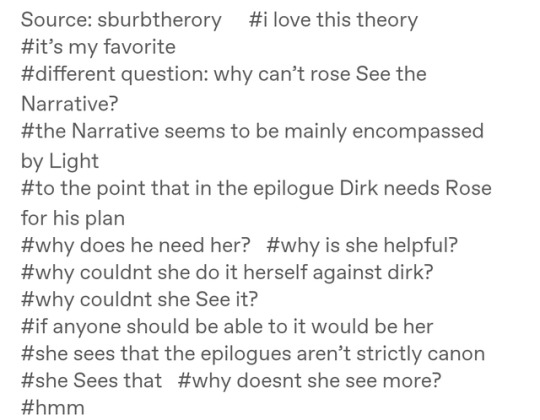
And onto this one! Again, separated so the last post doesn’t get too long.
I really like the sound of using tag analogy for narrative awareness! I’m assuming you mean something like this:
The main post is what the characters are aware of and see. It’s the basic things like actually doing the actions and saying their respective lines. This is the very basic, very simple stuff that a fair amount of players can have access to. All of it’s in universe, such as Vriska’s mind control abilities being her taking over someone’s narrative, but having a more more in-universe effect.
The tags, on the other hand, are the more complex things that usually fly by most characters. It’s the hand that tells them what to do, something they’re not exactly aware of. It’s the narrative that comes up with Dave’s lines before he says them, and it’s the stuff that real-world Hussie writes. This would be something that, for instance, Dirk sees - and that’s how a lot of his narrative works. He writes in the tags where it’s hidden, and people respond to what’s in the main body.
So when we come to Dave, he’s vaguely aware of the tags. He sees more than just the main body of text. But for him, it’s more like a fleeting glance; he doesn’t have the ability to really sit down and read them.
In essence, it’d be like me writing all of this, and then putting in the tags “there’s no other way for this to work. It’s absolutely impossible, and anyone who says otherwise is wrong”. That’s my inflection as the author, but it’s hidden far away from the more neutral style of writing I use for my theories (wherein I try to use evidence as well as my own thought process for something more real and believable). Someone with narrative awareness would physically be able to see that text, and go, “hang on, is any of this actually true? Is this person just making it all up because they think they’re right?”
Someone with narrative influence would be able to edit everything. So, think about the editable reblogs extension on XKit. That’s a tool of narrative influence, because then you can go into my text and change everything to suit your own narrative.
The only thing you can’t change are my original tags - but someone will complete and total narrative awareness and influence would be able to hack into my account, edit this post, and then change the tags themselves, completely overwriting my narrative.
That last one? That’s what we see Calliope do in Meat when she drowns Dirk out.
As for why Rose can’t see the narrative...
From what we can see in canon, Seers of Light can only See that which they Know. That’s why it’s so important for them to continue Learning and finding all this Information; they’re essentially blind without it.
It’s also why they, more than any other Seer, need to have someone to guide them at first. They can’t do anything if they can’t find a place to start, something to look into, Information to drive their sight.
How do we know this for sure? Rose can’t See her mother’s death until she’s told about it by Jade. She hadn’t thought to check in on her, and thus it was hidden from her sight - despite it being so important to the Plot. Someone who can see the entire Timeline would have seen this much, much sooner.
If Rose doesn’t know her Mom will die, there’s no way she can look into the future and See it - because Time isn’t her Aspect. She doesn’t have the entire Timeline set out before her, just the bits that are Important to whatever task she’s trying to do. She likely doesn’t even know how other Timelines work besides the Alpha one, because it’s only the Alpha timeline that’s Important (hence why Doomed Rose couldn’t See in the Doomed timeline; she has no idea what’ll happen to her once the timeline resets because they’re in an isolated, Unimportant timeline).
Likewise, she doesn’t know the whole Truth about the Tumor until much later into her research. She isn’t capable of looking that far into the future to find what it is - she actively has to destroy her planet in order to seek it out, and be guided by Doc Scratch along the way.
The importance of this is that Rose can’t See, for instance, every single timeline of a session, every single thing that could be done or what the specific outcomes will be. She can only work based on what she knows, and what she Sees will predominantly centre itself around significant Plot Points that help her determine how to stay on the Alpha Timeline.
If she doesn’t Know that something happens, or that thing is Insignificant to the overarching Plot, Rose won’t see it.
There is still a lot that blindsides Rose even later into the comic, and a lot of that is simply because she didn’t Know enough about them to be prepared for what would actually happen.
Hell, she didn’t even know that her and Dave going on the “suicide” mission to the Green Sun would lead to them both Godtiering. If she’d done as she intended to, she would have ensured Dave got a permadeath in her attempts to leave him out of it. This is the sort of stuff Rose is incapable of Seeing - all because she didn’t know about the Sacrificial Slabs, and can’t just look into the future as she pleases to See what’s going to happen.
So, why isn’t Rose aware of the Narrative? If Light is about the Plot and Importance, surely she should be hyper aware? Especially when Dirk is involved?
Rose can only see what she Knows.
Rose does not know that her entire world is just a comic being written by a man in another universe. She doesn’t know what the narrative is as a full, fundamental thing - and as much as she talks about Irrelevance, Truth, and everything else, she always talks about it in the sense of a theoretical story.
Rose doesn’t Know what the actual plot is. She just Knows it within the confines of her own universe.
This is something she confirms in the Epilogues. It’s only as she becomes her Ultimate Self that she explains this:
ROSE: My abilities have broadened considerably beyond their previous horizon. They shed light on many unseen events. Past, present, future, in realities and frames of reference that have no intersection with ours at all.
It’s only in the Epilogues, under Dirk’s control, that Rose gets visions of more than just the things she Knows or actively seeks out.
I think it’s also important to note this conversation, a little futher down the page:
ROSE: No, this consequence isn’t physical, or even a disruption of the timeline. It’s more of a conceptual unraveling.
ROSE: If you miss the chance to authenticate canon events, something will take place that’s a bit difficult to describe, but I’ve encountered a term for it.
ROSE: It’s called “dissipation.”
ROSE: Like, a notional fading. As if something, somewhere, is undergoing a process of “forgetting,” and we are what is being forgotten.
ROSE: All ideas, people and their full potentialities, possible outcomes and their specific unfolding, all these things live inside conscious frameworks.
ROSE: The further removed we get from authentication of canon events, the less relevant they become, and they slowly fade from the conscious frameworks which kept them stable.
Like I said, Rose talks in concepts. She says as “as if something, somewhere, is undergoing a process of ‘forgetting’, and we are what is being forgotten” - not a distinct thing, the physical plot and storyline and comic of Homestuck itself, but something she doesn’t fully understand.
It’s “something” that’s undergoing a process of forgetting, which implies it’s US, the FANDOM, since the verb means it’s an action being taken - WE are forgetting Homestuck - and as a result, they who are being forgotten. Her narrative awareness is just enough that she can recognise what’s going on - that the fandom is forgetting Homestuck - but isn’t aware enough to say that’s what is actually happening. It’s just “notional” - a suggestion, a theory, something that doesn’t actually exist. It’s a way to describe what she understands in-universe.
Rose Knows enough to grasp the concepts, but not enough to get the full picture, and this is ultimately why she can’t access or see the narrative. While it’s fully within her grasp as a Light player (and we see Vriska doing something like it when she uses her mind control - essentially taking over the narrative of the person she’s controlling), the fact of the matter is that the Information isn’t there for her to use.
That’s why Rose stays so contained in-universe. There’s nothing from our universe to suggest that there’s a wider narrative, and nothing that she can fully latch onto to say that she Knows how it all works. Without that ability to Know that it’s a story, a webcomic, something created rather than something real that applies to and follows typical storylines and theories, she won’t be able to See the physical text that makes up who she is as a person, a character, a fictional being.
If she doesn’t Know that she’s a character in the mind of a very weird, nigh middle aged American man with a propensity for ridiculous bullshit, she can’t See everything that comes with the process of writing the fictional.
Questionably, this could be what’s killing her in the Epilogues - or it’d be a really cool theory, anyway. Rose, forced by Dirk, is becoming aware that everything she is, has ever been, and will be, is fake. She’s unravelling from the core because she cannot exist in-universe if she Knows too much about the out-of-universe. She cannot be a complacent character if she Knows that’s all she is. And when a character gains that sort of awareness, what do they become?
That ended up being significantly longer than I expected it’d be, so I’m going to leave you with this takeaway:
Why does Dirk need Rose if she can’t see the narrative? I think he explains that himself somewhere along the way within the narrative of Meat; she’s the most compatible version to him, essentially is him, and will understand the most out of anyone what he’s trying to do. There’s likely something we’ll see in the future to emphasise these points, but I also think he needs her fully fledged abilities - that of complete narrative awareness, to the point of recognising our universe - for whatever wild bullshit he’s trying to accomplish. That’s why he forced her awakening - that’s why she can survive it for so long.
13 notes
·
View notes
Text
Excarnational Christianity
It’s a funny thing growing up in the church. All my life I have been a part of various southern Californian, non-denominational, evangelical churches. These are all beautiful communities full of people who, to the best of my knowledge, have the purest intentions and are using all the tools that they possess to love and serve God. I love all the people I have grown up with and been shaped by; I owe so much to them! In the last few years however I have experienced a trend in christian culture that is described by philosopher and theologian Charles Taylor as “Excarnation”. I do not want to throw stones, so I will start and probably end with the experience of my own life of faith.
I am a 27 year old life long male evangelical who was naturally bound for the now cliche path of deconstruction. I had all the usual doubts and questions that people do growing up in conservative western christianity. How does the problem of evil, free will/god’s sovereignty, the trinity and the existence of hell work? Obviously these are old questions that Christ followers have been thinking through for a long time, but I thought they were profound and unusual questions to ask. After not having intuitive answers to these questions and being plagued by the general existential anxiety of being a teenager, I slowly became more and more open to christian thought, and thought in general, outside of my narrow tradition. I remember the first time I stumbled upon Tumblr accounts of quotes from the Desert Fathers, mystics of the greek orthodox, and catholic philosophers, incredible! I had no idea the contemplative and spiritual practices that were available. I remember starting to read The Practice of the Presence of God and feeling discouraged because I couldn’t think of how such a beautiful life was possible. Unfortunately this only scratched the surface and planted a seed. At the time I didn’t have the motivation or drive to really seriously dive into the theology of these christian traditions. It was easier at the time to just let the questions unsettle my faith than to actually take them head on and seek God in them. Much of the last four or five years has been a lot of feeling resigned to having a sort of halfway faith in which I lived with some of the ideas but without much of the actual experience of a life with God.
As I became more and more used this halfway-ness, it became easier and easier to question all of it. What are ideas without experience? I think that it is impossible to be proven into believing something that is so ethereal and abstract as a metaphysic of God as a personal being who has a real affect on the material world. Around 2013-14, as this became more and more normal, I also stumbled into the world of podcasts. At the time I was still adjusting to the life of an electrician and podcasts became a welcome companion. I became familiar with a whole spectrum of thinkers on all variety of topics, from the super conservative to the super liberal, the mystics as well as the materialists and the whole spectrum of “Godly” to “Worldly”. It’s hard to over exaggerate the variety here. I am thankful for the thousands of hours I have listened to the now well known christian deconstructionists, the new atheists and the cast of characters known as The Intellectual Dark Web. These were all people I was excited to learn from. I learned how I could bend my faith and question most of our christian ethics to fit within the materialist, secular lenses I had become versed in. Please don’t misunderstand me, I am still trying to find the right language for these shifts in my life. I say materialist and secular in the most neutral tone possible, without any of the vitriol I remember hearing the conservative culture of my childhood condemn the best music out there as “worldly” and “secular”. I simply mean I became more and more comfortable with a faith-less or unspiritual lens of viewing my own christian faith. My faith became less and less a force that shaped me, and more and more something I just thought that I possessed in a distinct compartment of my life. Looking back I think that is the critical difference. I maintained all the proper ideological commitments to my faith, but lacked all experience of it. I understood that emotions and experience are completely arbitrary paradigms and thus a lack of these was not a real reason to seek a new way of thinking. Isn’t that what part of faith? Believing without feeling? I told myself I shouldn’t worry too much what I feel but I should be concerned with having right belief and right action.
This brings me to the term Excarnation. I had never heard of this concept before until reading James K.A. Smith’s book “How (Not) to Be Secular”. The book is a commentary and guide to a much larger work by Charles Taylor called “The Secular Age”. That is book is over 800 pages and supposedly very challenging so I opted for the guide. In the book Smith highlights what Taylor calls Excarnation:
“The process by which religion (and christianity in particular) is dis-embodied and de-ritualized, turned into a “belief system.” Contra incarnation, sacramental spirituality.”
I won’t be able to do this concept justice entirely on my own so I would really recommend picking up the book or listening on audible. My takeaway though was that this concept describes perfectly the feelings I have experienced in my life of faith. I have felt the movement towards excarnational christianity when our faith is made more into a call to serve, a set of ideas, or a moral code instead of an experienced way of believing in and being shaped by the transcendent reality of God.
What am I even saying?
I realize at this point I am starting to sound very highfalutin (I can’t believe that is actually a word). So what do I mean by all this? I simply believe that as my experience of faith inevitably lost the naive confidence of fundamentalism and conservative belief, it became open to all sorts of serious legitimate criticism. This shift allowed for the process of deconstruction to begin and thus a willingness to question how sound all my beliefs were. This sort of questioning coupled with a commitment to not leave a community of faith then disrobed my lived experience of the faith of any sort of transcendence. Again I fear that sentence was ridiculous. What I mean is the weekly church service as well as my participation in our christian community ceased to be anything special or transcendent, but instead became as hollow or ordinary as any other social gathering. I found that when the fundamentals of spirituality are questionable or seem untrustworthy all the magic leaves. At that point it feels impossible to expect an experience of faith, much less one that could actually change what my feelings or desires are inside my mind and my heart and by that change, create a real change in my way of life.
I would not be so bold as to state that this is happening to many other people, but I also don’t think I am all that special or unique so I would like to propose that as a question. Have you experienced this sort of shift in thinking or experience? Does Taylor’s concept of excarnation resonate at all with you? I am grateful to Taylor and Smith for giving me the framework to articulate what I think is a real, personal phenomenon. I have felt and experienced this thing, but I have not had the right language to explain or convey what this internal shifting feels like. I think we all know how frustrating to feel something and understand and not know how to articulate it.
I could, and might eventually, write a lot of strongly worded paragraphs on the specifics of how disenchanted and uninspiring I, and maybe an entire generation of believers, feel that mainstream western evangelical christian faith is, but I am worried that I would veer off into uncharitable waters. My intention and hope is that I have described what that disenchantment and excarnation feels like on personal experiential level. I am still trying to untangle what was self imposed and what was externally caused in that whole process. On the constructive side, I cannot describer how grateful I am though that I have found a whole set of writers and preachers that have renewed my life of faith and commitment to the church. There are really, really good and sincere thinkers and communities of people who are trying to do the good and hard work of living as “Apprentices of Jesus” and all it entails.
To close, I would like to offer a bit of G.K. Chesterton’s Orthodoxy:
“When I fancied that I stood alone I was really in the ridiculous position of being backed up by all Christendom. It may be, Heaven forgive me, that I did try to be original; but I only succeeded in inventing all by myself an inferior copy of the existing traditions of civilized religion...I did try to found a heresy of my own; and when I had put the last touches to it, I discovered that it was orthodoxy.”
#Christianity#christian life#life of faith#theology#christiantheology#christianblog#theologyblog#Charles taylor#James K.A. Smith#Secularism#spiritual formation
1 note
·
View note
Note
Hi, thanks a lot for your answer about floral competition but it isn't what I was asking. I know how one works and have a specific reason for the couple to meet the winner. The problem is that I don't do floral art and barely know a thing about design, so I need to know how to describe them and not make what I describe improper or impossible flower care, downright ugly, out of place, etc without actually being an expert who can design something great, especially a winning design.
Hi again!
Thank you for the clarification, you’re right I kind of missed that you want to describe the actual competition. But only kind of because one of the things that’s important for you to understand here is that competitive floristry largely happens behind closed door. Preferably even each florist to themselves. The events generally aren’t advertised to the public (not counting the world cups), rather than exhibitions displaying the end results. That being said these two events always have to happen back to back because flowers don’t last forever so the works are often made available to the public the same day they were created. Usually in the afternoon, evening or on the following day.
This is largely due to the fact that competitive floristry calls for complex arrangements that take like an hour and a half to build in the first place. And while people may enjoy watching that, it would come at the cost of the florist's concentration and perhaps their flowers too. You may remember I’ve talked about that in the previous post, however, there’s a second reason this doesn’t happen. And that’s cause the actual evaluation and assessment takes foreeeeever. (I was so bored out of my mind that I brought my laptop to our finals so I could write some while waiting for the examiners judgement, me and some classmates ended up listening to music for the longest time of our wait. It was like three hours and we were only five people.) There’s a huge check-list of technical and art-related topics to go through and it will take the jury several hours to complete it for every arrangement. Technique is almost the most important thing so it makes up a rather large chunk of the evaluation sheets actually, so your florists are most likely to get points deducted in that department. People who aren’t acquainted with floristry likely won’t even notice the blemishes a jury has to criticise so it’s not necessarily essential knowledge for your characters.
This masterpost is from way back, but it does give a good idea about what florists mean when they talk about technique. Technique at all times has to be well hidden by your florists. Although there are a few exceptions, like floral tape on a stem not counting for corsages. However, most technique is often hidden well enough to the untrained eye, keep that in mind for the characters who marvel the artwork.
The first thing you will have to ask yourself is whether or not the competition they attend is behind closed doors. Because if it is, you’re fine with just laying focus on the best (or the first three) arrangements, while pointing out general details about the rest. Their general opinion on colour, type and size should be sufficient. Maybe they notice a flower they like too, but unless they think someone else’s is waaaay better they’re not going pay much attention to detail once they see the others.
Whether or not the florists are going to work in the same space or each gets a separate room may depend a little on the location, but usually either or works. Especially if nobody needs extra space. One could even request to work by themselves if it helps them, juries aren’t picky about that. It’s more important that everyone finishes on time. Your characters may even choose to wear earplugs or headphones. I wore headphones during my midterm because talking to others makes me a slower florist and that was bad when I was working on a schedule. So I had a playlist that was roughly half an hour.
Given that every competition, there will be some for the florists too. Usually, flowers are allowed to be prepared, meaning they’ve been rid of all excess leaves, and thorns or side shoots. However, they won’t be allowed to cut them to size already. They will also have extra flowers in case something breaks. Same goes for wiring.
From there on out it’s everyone for themselves. Your florists will be busy thinking about how they have to do their arrangement, what has to be prepared first and which flowers come first. Size, shape and colour play a huge role in which flowers are chosen for which role in the arrangements. But as a rule of thumb lighter colours have to be set higher than darker ones, however, for example, a blue larkspur would have to be set above a white rose because of its shape and character. So your winning florist might catch a glimpse of their surroundings but will for the largest part be lost in their work. Afterwards comes the waiting, maybe even the announcement of the winner, unless that’s supposed to be public, and at last the exhibition where the public will be invited. (And family and friends usually.) If the arrangements aren’t already where they are supposed to be the florists have to set them up for the exhibition. This, however, depends on whether or not the arrangements are fit for moving in the first place.
The next question you should ask yourself is what sort of arrangement you have in mind for the winner. What sort of framework does it have? How tall is it supposed to be? Is it wall-like? Supposed to be set on the ground or on some sort of pedestal? Is it a wreath in any way? (Basically, is it round like a circle and made off plant? There you go consider it a wreath.) Are there branches? Is it supposed to be hanging? Go look at pictures of floral arrangements and write down what you like. Look at vases and basins and baskets and the likes – again write down what suits your tastes. Look at colour gradients and write down what you like, ask google if flowers come in that colour if you aren’t sure – write down what you like. (Complementary colours also work well.) Have a look at wreaths and garlands – write down what you like. Because this is the part where floristry is just another art form and what’s art supposed to be other than pleasing to the eye. Which is an utterly subjective thing in the end. The one thing I cannot tell you is what any of the pieces are going to look like, there are too many factors playing into it including the character of the people making them. I usually go into it by deciding I like a flower and go from there and don’t really have an idea of the final product till I’ve created it unless I am forced to articulate it.
Colors that almost clash make visual tension that can be flashy and attention getting. (Example: pale lavender daisy mums with bright orange gerberas). - Mod Den
(You should also give the theme of the competition some thought, is it freedom, is it love, is it all retro etc. because that too will shape the arrangement in one way or another.) The bottom line here is that a lot is possible and just because Picasso may not be your taste and Monet is doesn’t mean its immediately ugly. Even if we’re talking floral arrangements and not painted art. Same rules apply. You don’t have to describe your winning arrangement down to a t, as long as you get across that it’s bedazzling and a masterpiece of craftsmanship that’s more than enough. Emotions are more important in describing artworks than knowing in which directions the brush went when crossing the canvas. For example, you could have them compliment their use of colour theory.
It’s a floral art competition, the designs can be *anything* and other than not showing the underlying support in ways that shouldn’t be, and the basic principles of design (proportion, size, form, color).
If a reference needs to be made to a design, then vague comments about the use of a certain flower or the way one of the elements of design were implemented would be best. Otherwise a specific design has to be completely thought up, checked for feasibility, and then it’s still going to be subjective of if that one should win over some other one. Heck, maybe even one of the characters thinks the 2nd place design was better, happens all the time in art competitions with other media.- Mod Den
What I can tell you is that you won’t have to worry about care unless your winner made a bouquet. Which would be an open access competition, like what I talked about in the previous answer. However the larger the competition the more likely it won’t be the only thing your winner made in the end. And bouquets only require care because they need to be cut and given fresh water. (A slanted cut with a regular boring fruit knife or preferably a pocket knife with a single blade. Many florists carry one of these.) Floral foam already takes care of everything because it’s soaked through with water and giving the stems an edge makes piercing into it way easier. (Note: Your florists do know that floral foam needs to be given a minute or two to soak up the water instead of being emerged in it because the latter only causes a dry centre and sad droopy flowers through that.)
Of all the things out of place, you could describe flowers out of season may be the worst offenders, so no tulips in summer and chamomile in winter and the likes. A florist who doesn’t know their craft would not only make for a poor competitor. Actually, they would no competitor at all.
- Mod Jana
Disclaimer
This blog is intended as writing advice only. This blog and its mods are not responsible for accidents, injuries or other consequences of using this advice for real world situations or in any way that said advice was not intended.
7 notes
·
View notes
Text
Arplis - News: Telling Stories in the Dark
This is a guest post from Elizabeth Brooks. Elizabeth grew up in Chester, England, studied Classics at Cambridge, and now lives on the Isle of Man with her husband and two children. Her debut novel, The Orphan of Salt Winds, was described by BuzzFeed as “evocative, gothic and utterly transportive.” Her second novel, The Whispering House will be published in the U.S. by Tin House on March 16th, 2021. You can find her on Twitter @ManxWriter.
Content Warning: Mental illness and suicide
My sister knew how to tell a story, and she had an appreciative audience in me. I can picture us now: my 7-year-old self, sitting up in bed, hugging my knees, while 10-year-old Rachel delivered her latest installment in a loud whisper from the adjacent attic bedroom. Sometimes excitement got the better of her, the whisper rose to a babble, and Mum or Dad called up the stairs, “You two! Go to sleep! Now!” For a few wriggly, resentful minutes we were silent, but when the coast seemed clear Rachel would resume, with caution.
When I think about those storytelling sessions now, the happiness and humour are still there, but they are complicated by the fact that Rachel died by suicide at the age of 28, having suffered years of mental illness.
I wish I could remember one of Rachel’s stories from beginning to end, but I’m left with a muddle of impressions, scraps of detail. I know she relished telling stories about spoiled, bullying girls, of a similar age to us, whose crimes escalated until they got their comeuppance, and that she liked to end each episode on a cliff-hanger, leaving me begging for more.
Rachel didn’t just make stories up, she also wrote them down. There were stacks of notebooks in her bedroom, crammed with novels at various stages of completion— children’s stories, family sagas, romances, diaries and poems.
I was two and a half years younger than Rachel, and I began writing out of a desire — half deferential, half competitive — to emulate her. It was a struggle to keep up. I rarely seemed able to complete a chapter, let alone a book. I kept waiting for a tidal wave of words and images to sweep me away, but it never did. Whilst I was fussing about how to detach page one without ruining the aesthetics of my new notebook, Rachel’s pen would be flying. She would be biting down on the tip of her tongue, her shoulders rigid with concentration, a cup of tea cooling at her side. One day she’d be a published author; I was sure of that. In as far as we were Little Women, she was Jo.
I wish there was a name for the condition that destroyed my sister, so that I could describe it in a single word and expect you to understand. It began in childhood and worsened through adolescence and adulthood. Depression was a part of it, but by no means the whole. Schizophrenia comes close, but isn’t quite right. Whatever it was, it made her hate and harm herself. It drove her to run away from home, cut her arms with razor blades and starve herself of food. Sometimes it had her in floods of tears, sometimes she could hardly move for the sheer, dragging weight of it. Medication was a matter of trial and error, and although there were pills that helped a little, others did more harm than good. Counselling was useful, but didn’t get to the heart of the problem. Nothing ever did.
As far as writing was concerned, as far as anything was concerned, Rachel was at the mercy of her illness. One day she might be manically, exhaustingly creative; another day she might be too numbed to lift a pen. There were also times — and it’s important I don’t forget this — when the clouds lifted and she was allowed to be herself, for a while.
One of Rachel’s less successful night-time stories strikes me as darkly comic, in retrospect. If that sounds heartless, it’s not meant to: mental illness has its absurdities, interwoven with its cruelties, and it would be dishonest to pretend otherwise. I forget how old she was at the time, perhaps 11 or 12? Rachel began with her main character waking up one morning, but rather than launch him headfirst into his story, she proceeded to describe everything — everything — he did, from the moment he swung his legs out of bed. “He found his slippers under the chair, and he put his left foot in the left slipper, and his right foot in the right slipper, and then he went over to the door and took his dressing-gown off the hook and put his left arm in the left sleeve…” I managed to bite my tongue until our man finally made it downstairs, only to discover that his dishwasher needed emptying. “So he opened the dishwasher and took a mug out and put it away in the cupboard, and then he went back to the dishwasher and took another mug out and took it to the cupboard…” At this point I snapped, and Rachel got upset, which made me even angrier. I told her she was being weird, and that her story was boring. In my defense, I was little, and Obsessive-Compulsive Disorder was not part of my vocabulary.
We grew up together, but as my life unfurled, Rachel’s contracted. The stages I passed through — school, university, marriage, children — were typical enough, but set alongside what she was going through they seemed extraordinary, to the point of unfair. She ought to have been doing these things too, or something equally good, not wasting away in psychiatric wards, or overdosing on anti-depressants, or running away from home in a futile effort to escape herself.
We both continued to write, but the further we got from childhood, the more difficult it became to show one another our work. I was too embarrassed to share my navel-gazing attempts at poetry, or bits and bobs of prose, and Rachel’s writings, too, grew ever more private. Whenever she was well enough to put pen to paper, she tended to write diaries rather than fiction, seeking relief from her distress by pouring everything onto the page. I believe that’s what she was doing, anyway: I didn’t read her notebooks then and I couldn’t bear to read them now.
Rachel died of an overdose in 2005. It was around the same time, when my children were tiny, that I began to write more seriously. It took me a long time to work out what I wanted to write about, and longer still to find an agent and publisher, but I did in the end. The sense of achievement was real, yet it was tinged, as all those other “ordinary” life events had been tinged, with guilt. The logical part of my brain knew I’d done nothing wrong, but there was a sub-logical part, which wasn’t — still isn’t — so sure. How come I’d fulfilled the dream that was Rachel’s, long before it was mine? Had there only been room for one Jo March in the family? Could I, with my greater resilience, be said to have ‘won’ over my more fragile and sensitive sister?
There’s no point getting hung up on such questions — and I don’t — but I’m conscious of them simmering away, out of sight. It’s because of Rachel that I became a writer in the first place, and it’s partly because of her that I settle on the subjects I do. All my novels concern the ways in which people, including ‘normal’ people, are essentially mysterious. I seem drawn to create characters whose vivid internal lives drive them to commit strange, often extreme, acts.
Storytelling is, in part, an attempt to shed light on darkness. When something seems impossible to understand, it is instinctive to stare hard into the chaos and search for patterns and structures there. A narrative framework may do nothing to alter life’s harsh realities, but it’s comforting to have one, all the same. When Rachel died, I felt numb. I could come up with no adequate response in the immediate aftermath; what had happened seemed so pointless and cruel. Fifteen years on, it still seems pointless and cruel, but writing has helped me to face it. I have never fictionalised my sister’s story, as such, but I have explored mental illness, the impact of suicide, and the complexities of sibling relationships. Putting these things into words, and shaping the words into stories, is healing.
Maybe Rachel’s stories — maybe mine, maybe everyone’s — are flashlights sweeping the darkness, making sense of a frightening world, albeit in brief, fragmentary glimpses. This makes me hope that my residual guilt really is misplaced. Perhaps becoming a writer was not, after all, a private ambition that divided us, but a joint quest that unites us still.
!doctype>
#OurReadingLives #GuestPost #Writing

Arplis - News
source https://arplis.com/blogs/news/telling-stories-in-the-dark
0 notes